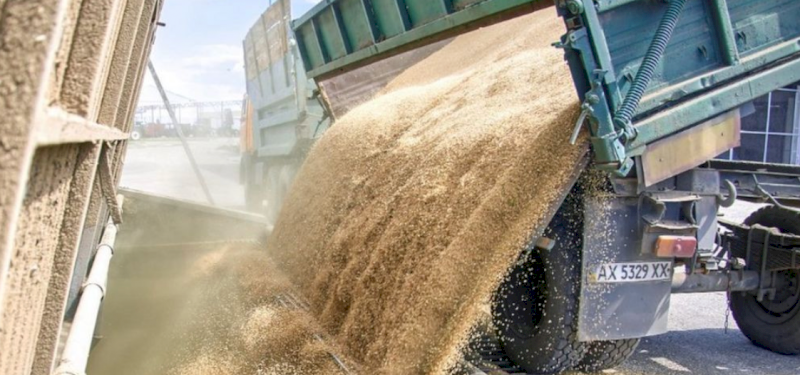Power struggle grips Russian grain export…
- By: "Farm Tender" News
- Cropping & Grain News
- Apr 09, 2024
- 380 views
- Share

By Peter McMeekin
The Russian grain export wrangle appears to have expanded with more exporters implicated and the departure of additional vessels delayed due to a widening phytosanitary dispute. The nation’s agricultural watchdog, Rosselkhoznadzor, alleges complaints, real or imaginary, have been received from importing countries about contract breaches relating to grain quality and quarantine requirements.
The issue erupted late last month when Petr Khodykin, the owner of one of Russia’s leading grain exporters, TD Rif, claimed that his ships loaded with Russian wheat were being blocked by authorities, with the company suffering huge losses due to the delays. At the time, Khodykin estimated that at least 15 ships were stranded due to the dispute, with a combined volume of as much as 400,000 metric tonne.
In a letter released by TD Rif before Easter, the company claimed that some of its export shipments had been blocked since March 18 after inspectors claimed the cargoes did not adhere to the required quality standards. The letter said that previous cargoes of the same wheat going to the same destination had “freely passed” inspections, meeting all the customer's safety, quality and import quarantine requirements.
According to a Rosselkhoznadzor statement late last month, 81 per cent, or 44 of TD RIF’s grain export consignments since the beginning of 2024, totalling more than one million metric tonne, had been found to be non-compliant with the phytosanitary requirements of importing countries.
Petr Khodykin claims that his company is under “unprecedented” pressure to sell its assets for a “negligible price”, a move seen by many analysts as the first step in the nationalisation of Russia's grain export pathway, so the Kremlin has control of the export flow, can eliminate rogue discounting, and get all of the incoming hard currency.
Strapped for cash following the invasion of Ukraine over two years ago, the Kremlin has manoeuvred to take more control of the country’s grain exports. Most major Western merchants exited the Russian grain market last year after several influential industry voices and local officials called for their role to be limited.
Rosselkhoznadzor has reportedly proposed redistributing export quotas among the nation’s compliant grain exporters at the expense of those with ongoing systematic failures, such as TD RIF. The agricultural watchdog has also proposed additional oversight mechanisms, including tightening phytosanitary protocols for export grain.
Founded in the southern city of Rostov-on-Don in 2010, TD Rif grew quickly and has been one of Russia’s biggest wheat exporters since the 2014/15 season, loading out more than 12mmt to international clients in the 2022/23 season. It’s now competing with export rival Grain Gates for the top spot on the podium after shipping a comparable volume of grain in the first half of this season, which began on July 1. Grain Gates exported 6.21mmt of grain (excluding pulses) in the six-month period, with TD Rif snapping at their heels on 6.18mmt.
Third on this season’s export volume list, with 2.87mmt, is local trading house Aston, who also became embroiled in the dispute early last week. Russian authorities halted the departure of two wheat shipments belonging to Aston, with quality again the stumbling block. Rosselkhoznadzor has reportedly refused to issue phytosanitary certificates, an essential requirement for finalising export documentation, and acceptance of the goods at destination.
It was also revealed that Russian authorities are delaying the departure of two Egyptian vessels loaded with wheat being shipped by Grainflower DMCC. The Dubai-based cereal merchant rose to prominence midway through last year, winning an Egyptian government tender as a relative unknown, and is widely rumoured to be an export partner of TD Rif.
Grainflower, which doesn’t make it onto the top ten 2023/24 exporter list, supposedly had several vessels held up last month that were eventually cleared to sail after a prolonged document delay.
In better news for Egypt’s General Authority of Supply Commodities (GASC), a substantial casualty of the Russian wheat export delays, an Egypt-bound cargo loaded by TD Rif has received the required phytosanitary certificates from Russian authorities. The MV Wadi Safaga, carrying 60,000 metric tonne of wheat, is now steaming toward its destination after GASC agreed to receive the cargo. Another Rif vessel carrying GASC wheat reportedly reached Alexandria in late March after being one of the first delayed last month.
The dispute and resultant delays to the Russian wheat export program have changed the market mood somewhat. Russian 12.5 per cent protein wheat reportedly traded at US$209.50 per metric tonne free on board Novorossiysk on Friday, down a buck day-on-day but up around US$15 from last month’s lows. Chicago wheat futures also sprang to life in Friday trade, hitting a one-month high, as the Russian export issue and spring weather risks in the northern hemisphere conspired to unsettle the market.
With the rise in Russian and a corresponding fall in European Union export values, offers out of the two origins continue to converge, with the latter desperately trying to compete on the world stage. Sellers via the Black Sea ports of Constanta, Varna and Burgas were all cheaper late last week, as were Polish and Baltic offers, with EU exporters searching desperately for business in the last quarter of the 2023/24 export year.
However, despite the ongoing grain industry power tussle in Russia, the shipping lineup out of its Black Sea ports for April and May is pointing to near-record exports. Interior Russian prices have rallied, and the farmer is engaging, needing to clear inventories ahead of what is currently forecast to be another massive wheat harvest.
Call your local Grain Brokers Australia representative on 1300 946 544 to discuss your grain marketing needs.









Share Ag News Via